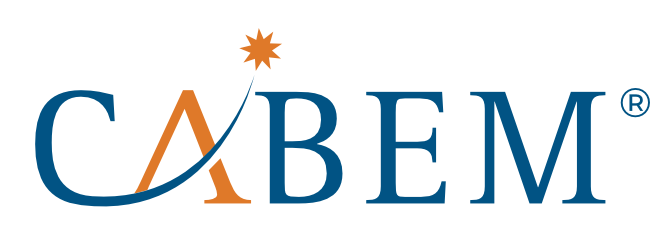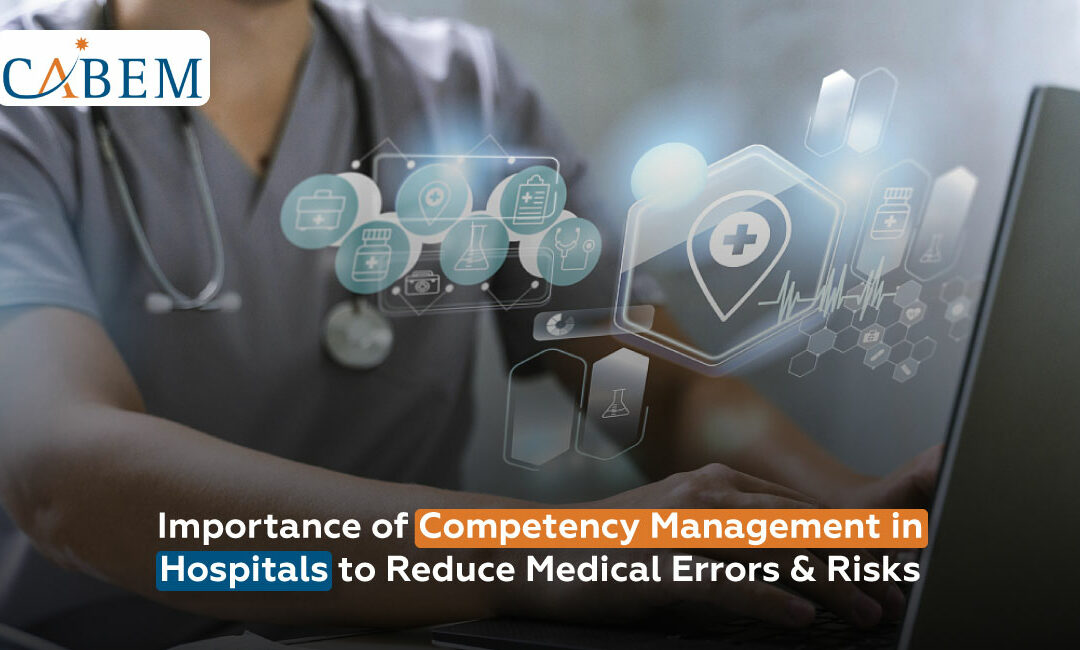Hospital environments are very challenging, requiring cooperation among specialists to ensure optimal outcomes. However, medical errors remain prevalent as technology advances and treatment improves.
Medical mistakes result in adverse patient impacts, higher expenditures, and lower patient confidence. One of the best ways of reducing such errors is through competency management.
At CABEM, we understand that competency management is an efficient solution for hospitals to ensure patient safety and improve healthcare outcomes by minimizing the probability of failure.
This blog post provides insight into healthcare competency management, its significance, and how it can help tackle medical risks and errors in the health sector.

What is Competency Management in Healthcare?
Competency management in healthcare ensures that individuals working in healthcare organizations have the required knowledge and qualifications to work in their assigned positions. This includes systematic identification and monitoring of changes in qualification requirements and staff competencies in medical and administrative positions to the current state of the practice and regulatory standards.
Competency management includes clinical skills, thorough medical knowledge, teamwork, and patient care competencies. In this manner, by dedicating effort towards enhancing these competencies, hospitals will be assured of forming a competent workforce capable of reducing mistakes, increasing safety, and providing the best patient care.
To learn how CABEM’s Competency Management Solution has revolutionized the clinical environment, read on Solution for Clinical Competencies Expands Across White Plains Hospital. See how our system can assist hospitals and medical franchises address critical issues affecting patient safety and staff productivity.
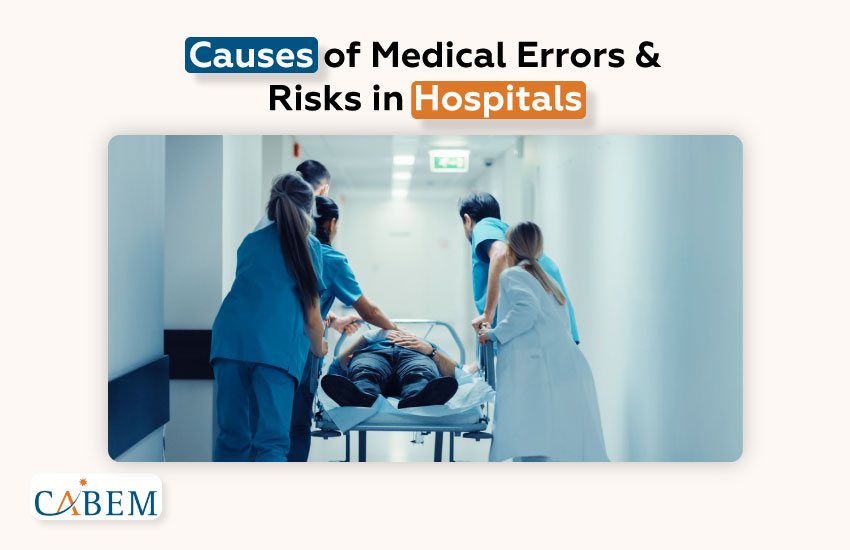
Causes of Medical Errors & Risks in Hospitals
Numerous factors cause medical mistakes, but competency management failure is the most prevalent cause. Healthcare professionals are less likely to make errors when there is proper education, on-site observation, and progression. Let’s discuss the primary factors causing medical errors and risks within the hospital environment.
- According to a National Insitute of Health publication, competency-based training in healthcare settings decreased clinical errors by up to 50%. The following statistic underlines the need to constantly assess and develop the staff competencies to minimize patient risks.
Lack of Standardized Training
Lack of monitoring and sustaining consistent training across departments or shifts may result in significant knowledge gaps. This is because when various healthcare providers are trained to different standards or are trained randomly, the quality of their healthcare will be affected. These gaps are felt more when decision-making involves high-risk procedures or complicated patient care plans.
- Different units or shifts have various levels of competency.
- Lack of continuity in training may lead to skill decay.
- Standard operating procedures (SOPs) are not uniformly applied.
Overburdened Staff and Communication Gaps
Healthcare workers are often overwhelmed, juggling different patients, complex cases, and long hours. The pressure can cause burnout, fatigue, and poor communication — and, in turn, medical errors. In such environments, the likelihood of miscommunication, missed steps, or rushed decisions increases, directly contributing to patient risk.
- Increased workload leads to stress, reducing focus and alertness.
- Communication breakdowns can lead to missed information or errors.
- Lack of time for proper training or skill updates.
Insufficient Tracking of Staff Skills
The need for a competent tracking system to determine the level of performance of healthcare staff makes it challenging to ensure that all staff members are performing within the correct standards. It is also evident from the study that many hospitals rarely take time to check the competence of their staff, with little or no skill gaps closed through continuous professional development or accreditation.
- Lack of real-time tracking of individual staff competency.
- Missing opportunities for skill refreshment and continuous improvement.
- Unclear understanding of each staff member’s qualifications and abilities.
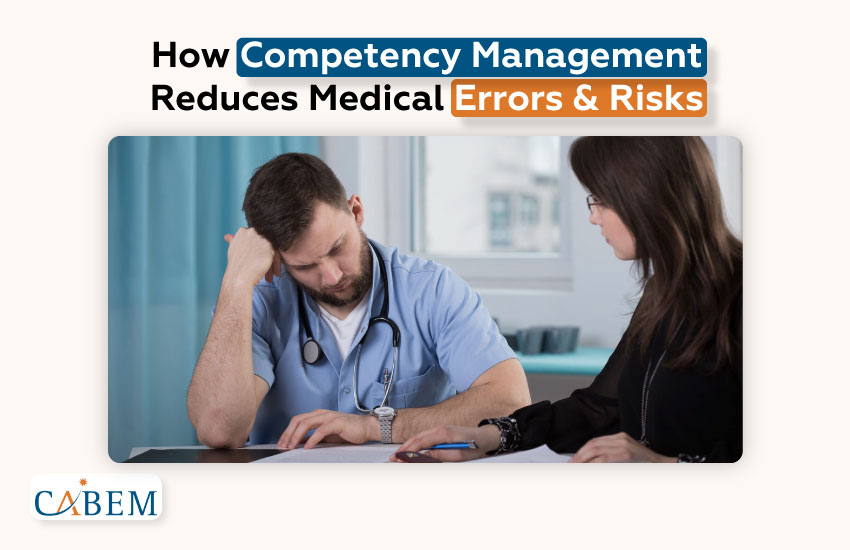
How Competency Management Reduces Medical Errors & Risks
Competency management is not solely focused on evaluating staff capabilities; it is a proactive approach to ensuring healthcare professionals have the skills and qualifications to provide safe and effective care. For this, hospitals can implement competency programs to promote reducing medical errors and enhancing patient safety.
Ensuring Role-Based Training
Role-based training helps to ensure healthcare workers receive focused education and training relative to their roles, responsibilities, and areas of expertise. When it comes to role-specific competencies, hospitals can be sure that the staff members’ competencies in their tasks are adequate and very high, which reduces the possibility of errors significantly.
- Lessens the risks of employees working outside their areas of expertise.
- Provides focused learning on key tasks and skills.
- Ensures a clear understanding of responsibilities and expectations.
Real-Time Tracking of Staff Credentials
A powerful competency management system lets hospitals track staff credentials, certifications, and qualifications in real time. This tracking mechanism guarantees that healthcare professionals are consistently informed of the latest credentials and training mandates. This also helps identify gaps in knowledge or where extra training may be necessary.
- Ensure compliance with relevant healthcare regulations and standards.
- Enables hospitals to note a shortage of skills in a particular sector quickly.
- Simplifies onboarding and credentialing for new employees.
Promoting Continuous Skill Development
Competency management is not a one-time task. It needs a process of ongoing growth that can familiarise healthcare professionals with novelties regarding techniques, technologies, and guidelines. Continuing education and staff training also reduces skill depletion, thus keeping staff qualified.
- It urges constant learning and professional improvement.
- Minimizes the risk of skill degradation from lack of practice.
- Keeps staff up-to-date on the latest medical procedures and techniques.
Enhancing Interdepartmental Communication
Competency management must always be followed closely with an interdepartmental communication enhancement plan. As a result, hospitals can improve teamwork and decrease miscommunication by ensuring that all stakeholders clearly understand personal responsibilities and competence levels. Coordinated and qualified workers can work together with less conflict and confusion.
- Helps in enhancing the flow of information across departments.
- Improves multi-disciplinary team collaboration.
- Prevents the omission of essential details due to miscommunication or misunderstanding.
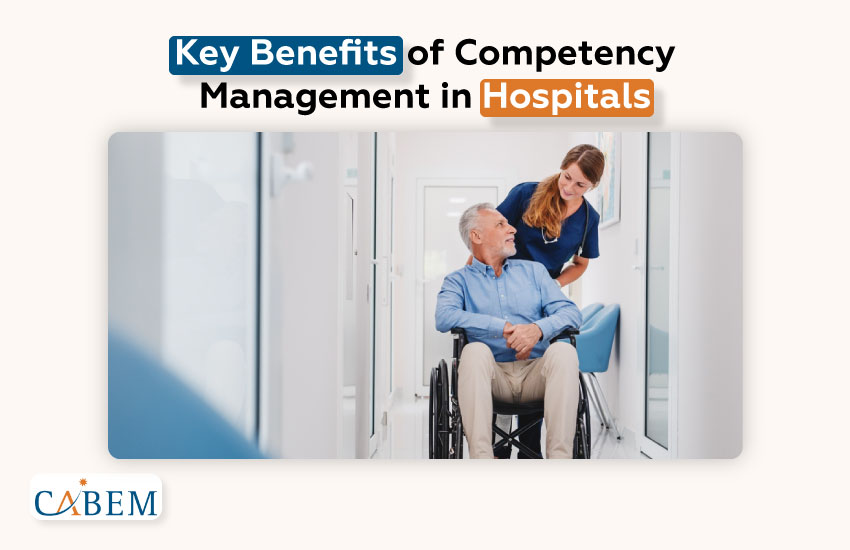
4 Key Benefits of Competency Management in Hospitals
Competency management minimizes error, gives numerous advantages to hospital functionality and patient results, and promotes work satisfaction. Here are four key benefits:
1. Improved Patient Safety
Competency management directly impacts patient safety, guaranteeing that every healthcare provider knows their stuff and is qualified. Well-trained staff are less likely to make errors that could harm patients, and the system has mechanisms to determine when gaps in training could endanger safety quickly.
- Decreases the incidence of avoidable medical errors.
- Improves the quality of patient care and service delivery.
- Boosts confidence in the hospital’s safety protocols and processes.
- A 2016 study published in the BMJ (British Medical Journal) found that medical errors are the third leading cause of death in the U.S., claiming more than 250,000 lives a year. It highlights the importance of healthcare systems, such as competency management, in reducing errors and improving patient outcomes.
2. Enhanced Regulatory Compliance
Hospitals must meet different regulatory norms and deliberate training and certification regulations. The competency management system will help identify compliance-related issues to local, state, and national laws, avoiding penalties or other legal repercussions. They also allow the hospital staff to be updated with the accreditation standards and guidelines.
- Reduces the time taken to track regulatory updates.
- Eliminates the possibility of severe consequences such as fines or penalties for failure to adhere to set rules.
- It would help ensure that the staff is always prepared for audits or any inspection that may come their way.
3. Better Staff Morale and Retention
When staff believe that there is continuous support from training as well as competency management, employees will be motivated to fulfill their assigned tasks. This can increase performance and productivity, enhance satisfaction and motivation at the workplace, and even lessen occupational stress and burnout. Hospitals that dedicate efforts to staff professional development ensure their employees remain committed to performing to the best of their abilities.
- Provides a clear career progression path for employees.
- Increases staff satisfaction through professional development opportunities.
- Reduces turnover by fostering a positive, growth-oriented work culture.
4. Reduced Financial Losses from Legal Claims
Competency management also leads to fewer medical errors, minimizing the risk of lawsuits and legal claims. This, in turn, helps protect the hospital’s reputation and mitigates financial losses related to legal settlements, fines, and increased insurance premiums. Staff who receive the proper training are less likely to be involved in an incident that leads to a lawsuit.
- Lowers the likelihood of expensive legal claims.
- Reduces malpractice insurance premiums.
- Protects the hospital’s reputation and patient trust.
To see how CABEM’s Competency Management Solution has transformed the credentials process in hospitals and medical franchises, we invite you to explore our case study: “Medical Franchise Manages the Credentials Process Through Strategic Integrations.” Discover firsthand how our platform effectively reduces medical errors and improves staff performance.
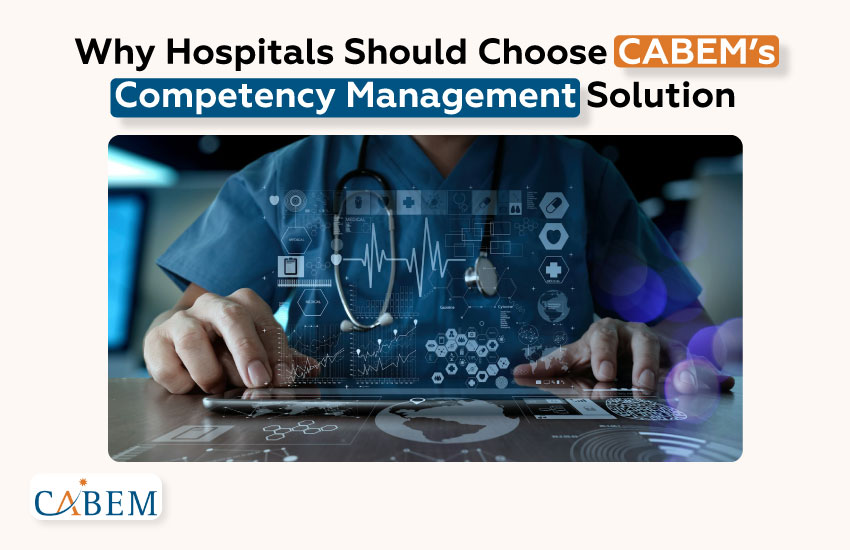
Why Hospitals Should Choose CABEM’s Competency Management Solution
At CABEM, we appreciate hospitals’ unique challenges in administering and managing competencies and ensuring patient safety. We offer a combination of role-based training and tracking or monitoring in real-time, together with skill maintenance over some time.
Our application supports the reduction of errors in healthcare, assists in the optimal performance of staff, and facilitates ease of compliance with regulations, all on a single platform.
Why should you select CABEM’s Competency Management Solution? Here are the reasons:
- Tailored to your hospital’s needs: Our innovative solution can be tailored to fit your hospital needs and workflows, allowing for the successful and timely integration of the solution into your current system.
- Real-time updates and tracking: An easy way to keep track of credentials, certifications, and competencies and set alerts for when updates are needed.
- Comprehensive training programs: CABEM offers a credible platform to ensure staff is improving and up-to-date through proper training programs.
- Easy compliance management: Automated tracking and reporting features help you stay ahead of regulatory requirements.
FAQ
Why is competency critical in healthcare?
Competency provides essential skills and knowledge for healthcare professionals to deliver safe, effective care. It decreases medical errors, enhances patient outcomes, and maintains compliance with healthcare regulations.
How can hospitals prevent medical errors?
To avoid mistakes, hospitals and clinics are expected to set comprehensive competency management systems to ensure that staff members are equipped with the proper training, current records, and adequate communication between the departments.
What are the most common causes of medical errors that competency management can address?
Some causes of medical mistakes that can be handled by competent management are poor training, ineffective communication, overworked staff, and poor management of staff capabilities.
How long does it take to implement CABEM’s solution in a hospital?
Implementation time varies based on your hospital’s size and the complexity of needs. This means that, in most cases, our system will be fully functional within a couple of weeks, during which we will provide all the necessary configuration and training.
